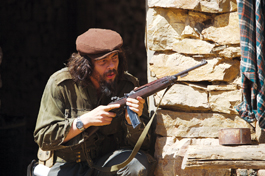home | metro santa cruz index | movies | current reviews | film review

Photograph by Teresa Isasi
LOCK AND LOAD: Benicio Del Toro's Che Guevara takes direct political action in Steven Soderbergh's biopic.
Guerrilla Filmmaking
Steven Soderbergh and Benicio del Toro tell the story of revolutionary icon Che in two-part epic.
By Richard von Busack
I don't want to touch the relative evil or good of Che Guevara's career. If you believe the right-wing blogosphere, Che was responsible for 14,000 executions. Still preserved in Internet ether is Paul Berman's Slate.com piece about the cult of Che, written when The Motorcycle Diaries came out. (Berman's own soapbox is somewhat diminished after his decision to bunk up with the Men Who Would Be Kings of Iraq.)
I personally wouldn't wear a Che T-shirt for exactly the same reason that Che wouldn't wear a me T-shirt. Whether in Barcelona, Oaxaca or the Mission, when Che's face appears, it's always apparent what's being said. People have appropriated this indomitable revolutionary's face as an icon against economic policies that have left a substantial part of the world starved and ruined. If they are wearing Che's image in some smarmy cafe while sipping coffee--"... that black water / They're drinking peasants' bitter blood!" as the Salvadoran poet Ricardo Castorrivas wrote--it's just another contradiction. Not being Che, I can live with contradictions.
Steven Soderbergh's two-part (shown back to back at some theaters in a roadshow version), large-scale, yet bracingly low-key story of Guevara's career moves over 13 years. It begins in an exile's apartment in Mexico City in the mid-1950s and finishes in the Bolivian mountains in 1967. The hinge of Che: Part One consists of flash-forwards from the Cuban revolution; the film shuttles between the jungle and Guevara's New York City trip in 1964 to the U.N. In that city, Che, now a state official, answers the Oriana Fallaci-worthy questions of a journalist (Julie Ormond).
Ultimately, Che: Part Two, seems more hurried. Maybe that is because there's nothing to cut back to from Che's endgame in Bolivia, except the moral questions: What kind of "help" it is to poor farmers to forcibly buy or steal their goods?
More could have been made, perhaps, of the story of Tania (Franka Potente of Run Lola Run). The matter of Che's mission into Bolivia as foreign aggression is countered nicely, though; President Barrientos (Joaquim de Almeida) himself has to call in the CIA to handle these guerrillas.
Soderbergh decides to leave the atrocities of the Bolivian government offscreen, particularly the shooting of some 87 abused and wretched miners. It's rare to see a movie about revolutionaries that's so delicate about pumping up revolutionary fervor; one of the most powerful stories of injustice is told, half-whispered by a Cuban campesino.
Demián Bichir's Fidel Castro is feline and silky; he lolls on his camp bed smoking his cigar when he gives orders. Soderbergh handles Fidel the way any sensible person would--with tongs. He stages Fidel's reading of Che's final letter to the Cubans on a TV set placed too close at a high, oblique angle to the camera. In Che as in real life, what you see on TV is not to be trusted.
Ultimately, Soderbergh's good common sense, and his extensive visual vocabulary as a director, makes this big movie enthralling. He keeps it right between under- and overproduced, filming his tale of two nations in parts of Puerto Rico, Mexico, Bolivia and Spain.
A billow of blue sea and Del Toro's tight, haunted face make up the voyage of the Granma. The last stand of the dictator Batista takes place in the Cuban town of Santa Clara in street-to-street fighting, with Che's troops sledge-hammering through walls to get to the highest point in town, the church roof. The scenes of the guerrilla fighting show why Defiance is such a bore.
Each battle in Che is urgent; I never knew how sick I was of impressionistic freeze-frame-loaded war-movie scenes until I saw such clean, well-considered compositions. In the second half, as Bolivian troops overwhelm the sick and worn-down revolutionaries, Soderbergh revives a great shot from the old Western movies: the horizon is a clear sharp shadow, and then, in the distance, a head pokes over the horizon line--and then come dozens of heads right after it.
The final skirmishes on vertical hills in deep brushy grass made me glad I'm a noncombatant. The key death scene in Che--the last one--is an impressive point-of-view shot. It should have been too fancy but somehow seems graceful as well as grave, detached as well as emotional; the movie is good to the last drop.
![]() CHE: PART ONE and CHE: PART TWO (R; 129 min. and 128 min.), directed and photographed by Steven Soderbergh, written by Peter Buchman, based on Che Guevara's memoirs and starring Benicio Del Toro, opens Friday at the Del Mar in Santa Cruz.
CHE: PART ONE and CHE: PART TWO (R; 129 min. and 128 min.), directed and photographed by Steven Soderbergh, written by Peter Buchman, based on Che Guevara's memoirs and starring Benicio Del Toro, opens Friday at the Del Mar in Santa Cruz.
Send a letter to the editor about this story.
|
|
|
|
|
|